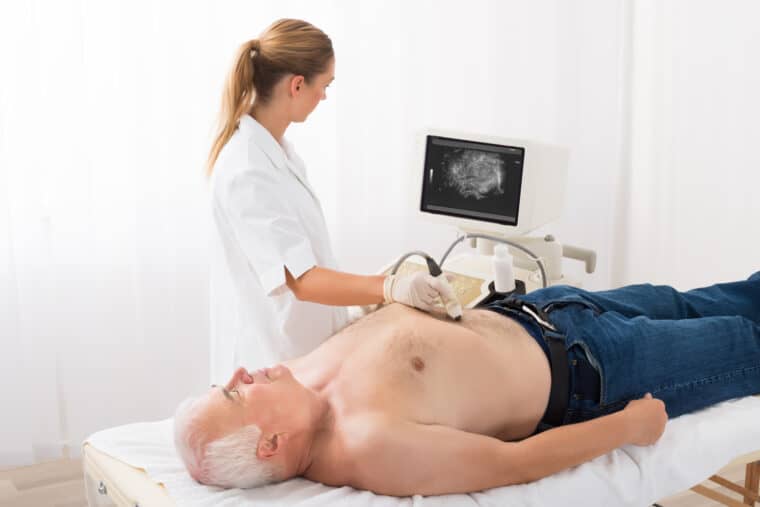Finding liver cancer early can make a big difference. You are far more likely to be successfully treated and cured if treatment starts when the cancer is still small.
There is no national screening programme for liver cancer. Most people who get HCC liver cancer have liver disease. So there are regular checks for people whose liver condition puts them at a higher risk of liver cancer. These checks will look at your liver and help to find any problems early.
You might hear these checks called “surveillance.” Surveillance just means that health care professionals are keeping an eye on your liver for any signs of cancer.
What is liver cancer surveillance?
Liver cancer surveillance is regular checks on your liver. These look for the first signs of liver cancer.
If you are asked to go for a liver cancer check you will usually have to go to a hospital or healthcare clinic. Many people have this check as part of other regular check-ups for their liver condition. You will have an ultrasound scan to look at your liver. This is a quick and painless test.
You might also be asked to have a blood test.
If the checks shows anything that might be a problem, you will be asked to have more tests. If everything looks fine, then you will be asked to come back for another check in 6 months. It’s important to go to your liver cancer checks regularly, even if you feel well and everything was normal last time.
Who should have regular checks for liver cancer?
Regular checks for liver cancer are usually only available if your liver condition is serious and puts you at higher risk of getting liver cancer. So if you have an appointment, it is important to get the tests done.
You can find out more about higher risk conditions below.
Higher risk conditions
If you have cirrhosis you should have regular liver cancer surveillance. Unless you are receiving end of life care.
You should have regular checks if you have long-term (chronic) hepatitis B and either:
- Liver cirrhosis
- A first degree relative who has had HCC liver cancer. Your first degree relatives are your parents, your children and your brothers and sisters.
If you have a small hepatocellular adenoma, that does not need treatment, you may be asked to come back for checks. Usually once a year.
If there are other things that put you at higher risk of HCC liver cancer, your doctor will talk with you about having these regular checks. Speak to your doctor if you are worried or unsure about whether you need surveillance.
What happens at your liver cancer check?
Your checks are normally arranged by your hospital liver unit. They should send you a letter with an appointment. The letter should also tell you how to get in touch with them if you need to change the day or time.
Before your appointment
To help doctors to see your liver well, it is important not to eat or drink anything for a few hours before your check. If this is difficult for you, for example if you have diabetes, you should call the liver unit for advice.
You will be having a scan of your tummy. So wear something that can be easily pulled up. For example, a T shirt with trousers or a skirt. You might also have blood taken from your arm so wear short sleeves or something that can be easily rolled up.
Ultrasound scan

You will have an ultrasound scan. This should take 15 to 30 minutes and is painless. If you have a liver condition, then you have probably had ultrasound scans before. Some people call them jelly scans because of the gel that is put on your tummy.
You will be asked to lie on a bed and lift or take off your top. The person doing the scan will be a doctor or a radiographer. They will put some gel on your tummy. Then they will put a small probe, a bit like a microphone, onto your tummy and move it around.
The probe uses sound waves to build up a picture of your liver and the area around it. You can ask the person doing the scan to show you the picture on the screen and explain what they are doing.
Blood test
You might also have a blood test. This will look for alpha fetoprotein, usually called AFP. AFP is a type of protein called a tumour-marker.
AFP can be found in the blood of people with cancer. But it is not a perfect test. Some people with cancer do not have AFP in their blood. And some people have AFP even though they do not have cancer. So this test must always be used alongside an ultrasound.
Your results
It can take a little while to get your results. If you have not heard anything after a month, get in touch with your doctor.
The results will be sent to the doctor in charge of your care. They will look to see if there is anything new on your ultrasound scan. Or if there has been a change in your AFP levels.
These things do not always mean that you have cancer. You will be asked to come back for more tests to take a closer look. This will usually start with a CT or ultrasound scan.
If your surveillance did not find any problems, then you should be told this. And sent an appointment letter when your next surveillance test is due.
